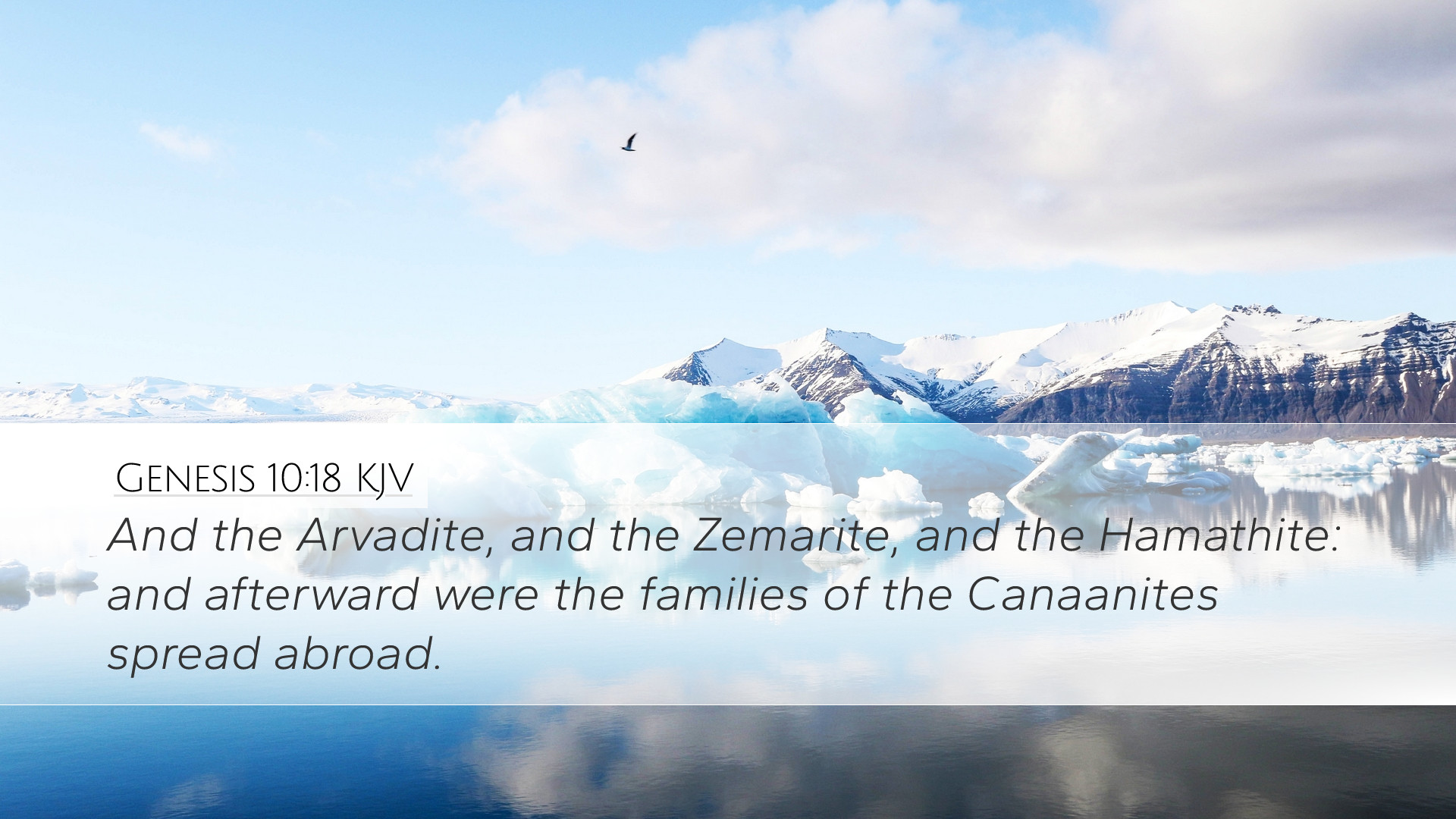Commentary on Genesis 10:18
Text of Genesis 10:18: “And the Arvadite, and the Zemarite, and the Hamathite: and afterward were the families of the Canaanites spread abroad.”
Introduction
This verse is part of a genealogical record in Genesis, specifically in the Table of Nations, which outlines the descendants of Noah's sons after the flood. The significance of this passage lies in its historical, cultural, and theological implications, presenting insights into the emergence of various nations and tribes.
Contextual Background
The genealogy in Genesis 10 provides a foundational understanding of the ancient world as described in the Bible. Each name mentioned signifies a lineage and a group of people, representing the diverse nations that descended from Noah. The inclusion of the Canaanites and their subsequent dispersion displays a pivotal moment in biblical history.
Insights from Public Domain Commentaries
1. Matthew Henry's Commentary
Matthew Henry notes that this genealogical listing serves to illustrate the fulfillment of God's command to multiply and fill the earth. He emphasizes that the Canaanites, despite being part of Noah’s lineage, became a significant focus in biblical history due to their eventual conflict with the Israelites.
Key Points from Henry:
- Propagating Nations: Henry asserts that every name represents families that contributed to the global population following the flood, emphasizing God's promise to Noah.
- The Canaanites' Role: The mention of Canaanites foreshadows their future prominence and the conflicts that arise, particularly in the context of Israel's conquest.
- Divine Sovereignty: The verse highlights God’s sovereignty in human affairs, as He ordains the spread of nations from one common source.
2. Albert Barnes' Notes
Albert Barnes provides a detailed analysis of the names cited in Genesis 10:18. He focuses on the geographical and ethnic implications of these groupings, examining the locations traditionally associated with these names.
Key Insights from Barnes:
- Geographical Distribution: Barnes explains that the Arvadites are associated with ancient Arvad, a city of the Phoenicians located on an island off the coast of Syria, highlighting the maritime connections of these people.
- Cultural Significance: He discusses how the Zemarites and Hamathites contributed to the Canaanite culture and their interactions with emerging civilizations.
3. Adam Clarke's Commentary
Adam Clarke delves into the linguistic aspects of the names mentioned in this verse. He relates the origins of these groups to their historical context, exploring how they integrated or conflicted with neighboring nations.
Clarke’s Contributions:
- Linguistic Analysis: Clarke notes that the names reflect certain characteristics and identities of the tribes, hinting at their customs and practices.
- Divine Judgment: He points out how the eventual actions of these nations led to their judgment by God, particularly through the Israelite conquest of Canaan, linking history with divine purpose.
Theological Implications
Genesis 10:18 serves to remind the faithful of the overarching narrative of Scripture, which includes themes such as:
- The Sovereignty of God: The detailed genealogy is not merely historical; it affirms God’s control over the rise and fall of nations.
- Human Dispersion: It reflects the fulfillment of God’s command to populate the earth, emphasizing His ongoing relationship with humanity.
- Foreshadowing Redemption: The mention of the Canaanites anticipates the story of redemption, showcasing why understanding Old Testament narratives is crucial for grasping the New Testament’s themes of grace and salvation.
Conclusion
In conclusion, Genesis 10:18 is rich with historical, cultural, and theological insights. By examining the commentaries from Henry, Barnes, and Clarke, one can appreciate the depth of meaning contained within genealogical passages of Scripture. This verse provides important context that reverberates throughout biblical prophecy, narrative, and ultimately, the work of Christ. As pastors, students, theologians, and scholars explore this text, may they find not only historical data but the fingerprints of God’s sovereign plan throughout history.


